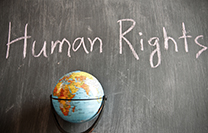The impact of engineering policy and practice on individuals and societies has often been overlooked in engineering education. Yet, engineering technologies and applications – from the extraction and processing of natural resources and manufacture of high-tech electronics to chemical processing and pollution remediation – affect the health, culture, opportunities and well-being of humans in often profound ways.
The University of Connecticut School of Engineering and the Human Rights Institute (HRI) are pleased to announce the expansion of the existing Human Rights minor program at UConn focusing on human rights within the engineering context. The confluence of engineering and human rights education is a natural fit and reflects engineers’ growing awareness that our technological designs, processes, policies and practices transpire within larger ecosystems and contexts. These, in turn, have varying degrees of impact upon the rights and well-being of individuals, families and cultural norms.
New cross-listed courses, including “Assessment for Human Rights & Sustainability” and “Sustainable Energy for the 21st Century” will be offered beginning in the fall 2014 semester and taught jointly by faculty from both disciplines.
The partnership and new coursework emerged from a shared commitment among the leadership and faculty from both units – initiated by a group of core faculty that included HRI professors Shareen Hertel, Kathryn Libal and Emma Gilligan, and engineering professors Allison MacKay, Daniel Burkey and Kazem Kazerounian – who sought to construct a pathway through which engineering and social science students could explore the human rights impacts, sustainability and social responsibility of engineering projects across multiple sectors, including energy, infrastructure, and water resource management.
Through interdisciplinary collaboration, the School of Engineering and HRI also aim to engage human rights scholars and students – particularly those in the social sciences – in appreciating the rights dimensions of key STEM fields. By cross-training a new generation of professionals in both fields, this initiative increases the potential for dynamic solutions to long-standing problems stemming from energy scarcity, under-development, and environmental stress. In the process, the collaboration will build on UConn’s hallmark interdisciplinary approach to human rights education and its top-flight engineering program.
Students interested in pursuing the human rights minor in engineering can also participate in a Study Abroad experience on the “Politics of Energy and Sustainable Development in Turkey,” which includes opportunities for practical fieldwork in nongovernmental organizations and/or companies involved in the energy and economic development sectors. The program will debut next summer.
For additional information, please contact Associate Dean for Undergraduate Education Daniel Burkey in Engineering (daniel@engr.uconn.edu, 860-486-5466), HRI Undergraduate Director Samuel Martinez (Samuel.martinez@uconn.edu; 860-486-8739) or HRI Program Administrator Rachel Jackson (rachel.jackson@uconn.edu; 860-486-5393).




